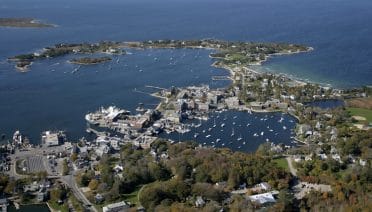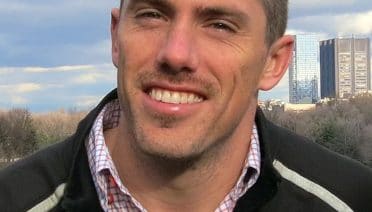Press Room
Woods Hole Oceanographic Institution (WHOI) has received the highest rating for sound fiscal management, accountability, and transparency by Charity Navigator, the nation’s largest charity evaluator. WHOI has earned the highest 4-star rating for seven consecutive years, a distinction attained by […]
An international team of researchers led by deep-sea biologist Tim Shank of the Woods Hole Oceanographic Institution (WHOI) will use the world’s only full-ocean depth, hybrid remotely operated vehicle, Nereus, and other advanced technology to explore life in the depths of the Kermadec Trench.
One of the greatest mysteries facing humans is how life originated on Earth. Scientists have determined approximately when life began (roughly 3.8 billion years ago), but there is still intense debate about exactly how life began. One possibility – that simple metabolic reactions emerged near ancient seafloor hot springs, enabling the leap from a non-living to a living world – has grown in popularity in the last two decades.
Recent research by geochemists Eoghan Reeves, Jeff Seewald, and Jill McDermott at Woods Hole Oceanographic Institution (WHOI) is the first to test a fundamental assumption of this ‘metabolism first’ hypothesis, and finds that it may not have been as easy as previously assumed. Instead, their findings could provide a focus for the search for life on other planets. The work is published in Proceedings of the National Academy of Science.
Scientists gave the rebuilt Alvin submarine two thumbs up after field-testing the nation’s only human-occupied deep-sea research vehicle for the first time after a major $42-million overhaul that dramatically upgraded the sub’s capabilities.
In a paper published in the open access journal PLOS ONE, researchers at Woods Hole Oceanographic Institution (WHOI) and colleagues identified a core skin bacterial community that humpback whales share across populations, which could point to a way to assess the overall health of these endangered marine mammals.
Under a National Oceanic and Atmospheric Administration program called Quantitative Ecology and Socioeconomics Training (QUEST), the new partnership will focus on teaching and advising in a graduate fisheries program and developing new technologies to improve assessment and management capabilities.
As towns across Cape Cod struggle with problems stemming from septic systems, a recent study by a Woods Hole Oceanographic Institution (WHOI) scientist focuses on one specific toxic by-product: mercury. In a study of local groundwater, biogeochemist Carl Lamborg found […]
The Woods Hole Oceanographic Institution (WHOI) has appointed Christopher Land to be its General Counsel and Vice President for Legal Affairs. Land assumes his post on March 3.
As general counsel, Land will provide advice, opinions and representation on all […]
As part of on-going research nearly four years after the Deepwater Horizon oil spill, scientists from the Woods Hole Oceanographic Institution (WHOI) will team up with a group of high school students in Florida to collect remnants of oil from […]
Woods Hole Oceanographic Institution (WHOI) has teamed up with the public to build the most comprehensive and up-to-date dataset on marine radiation levels in the aftermath of the 2011 Fukushima Dai-ichi Nuclear Power Plant disaster. With no U.S. government or […]
Scientists have been keeping a close eye on how radionuclides from the Japanese power plant are being transported in the Pacific Ocean since the Fukushima Dai-ichi Nuclear Power Plant accident in March 2011. Now, three scientists are taking a closer […]
Woods Hole Oceanographic Institution (WHOI) scientist Kristopher Karnauskas has been selected to receive a 2014 Sloan Research Fellowship. Awarded annually since 1955, the fellowships are given to early-career scientists and scholars whose achievements and potential identify them as rising stars—the […]
While countries such as Japan, Norway, and Iceland often are criticized for their commercial whaling practices, Woods Hole Oceanographic Institution (WHOI) marine biologist Michael Moore points out how the majority of nations are also complicit in killing whales by deploying […]
For four decades, waste from nearby manufacturing plants flowed into the waters of New Bedford Harbor—an 18,000-acre estuary and busy seaport. The harbor, which is contaminated with polychlorinated biphenyls (PCBs) and heavy metals, is one of the EPA’s largest Superfund […]
Over the past two decades, ice loss from the Greenland Ice Sheet increased four-fold contributing to one-quarter of global sea level rise. However, the chain of events and physical processes that contributed to it has remained elusive. One likely trigger […]
With concern among the public over the plume of radioactive ocean water from Fukushima arriving on the West Coast of North America and no U.S. government or international plan to monitor it, a new project from Woods Hole Oceanographic Institution […]
After a three-year overhaul and major upgrade, the United States’ deepest-diving research submersible, Alvin, has been cleared to return to work exploring the ocean’s depths.
Ocean researchers working on the coral reefs of Palau in 2011 and 2012 made two unexpected discoveries that could provide insight into corals’ resistance and resilience to ocean acidification and to aid in the creation of a plan to protect them.
Woods Hole Oceanographic Institution (WHOI) marine chemist Ken Buesseler began sampling and analyzing seawater surrounding the Fukushima Dai-ichi nuclear power plant three months after the 2011 disaster. Today, he launched a crowd sourcing campaign and citizen science website to […]
The Paul G. Allen Family Foundation has awarded Woods Hole Oceanographic Institution (WHOI) assistant scientist Anna Michel $200,000 to develop a sensor that will enable scientists to analyze how methane emissions fluctuate in the Arctic.
Methane is a greenhouse gas with […]


